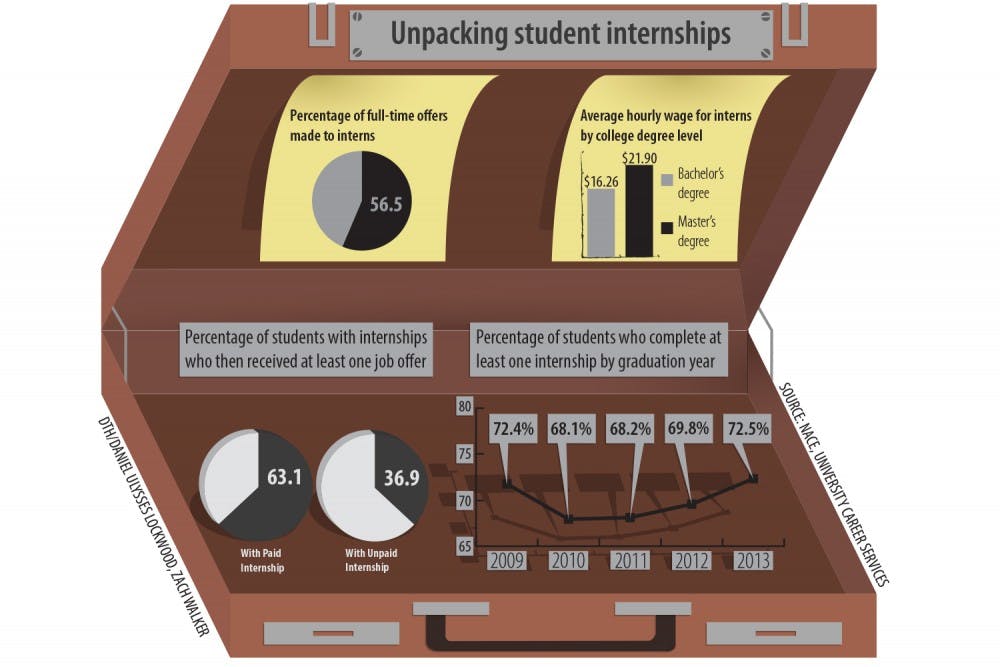“The law is fairly clear on what should be a paid versus an unpaid internship and what kind of employers are covered — the problem has always been enforcing the law,” said Edwin Koc, director of Strategic and Foundation Research at NACE.
Koc said several former interns filed lawsuits in 2012 that claimed their employers violated labor laws. Conde Nast, a media company sued by former interns, decided to discontinue its internship program entirely in fall 2013.
In response to the controversy surrounding unpaid internships, New York University implemented measures to screen internships. Employers must indicate that they meet federal labor guidelines. NYU’s career center also features a guide to help students recognize illegal unpaid internships and a directory of internship coordinators for the University’s different departments.
“I’m hopeful that more colleges will educate and defend their students against illegal and unethical employment practices while at the same time doing things that actually help students,” said Ross Perlin, author of “Intern Nation: How to Earn Nothing and Learn Little in the Brave New Economy.”
While UNC has not made any recent changes, University Career Services, as well as different academic departments, has measures in place in that monitor the quality of the internships it promotes.
“UCS attempts to vet employers who post positions in Careerolina and always questions employers whose positions appear to be preying on students for their talents and skills without paying them,” said Ray Angle, director of University Career Services.
The Kenan-Flagler Business School works closely with University Career Services, as well as employers, in order to ensure it only promotes responsible employers, said Lawrence Mur’ray, director of the undergraduate business program.
“We do work directly with some of our corporate partners to build those relationships,” he said. “And by partnering with UCS, any company would have to agree to our expectations of what a student’s experience should be like.”
While the number of unpaid interns in the business school is low — around 9 percent had unpaid internships — Angle stated unpaid internships would have to be entirely illegal for UCS to stop promoting them.
“Many industries rely heavily on unpaid internships and therefore are valid,” he said. “The cases currently being questioned — especially in the entertainment industry — are concerned that profit-producing industries are using unpaid internships to widen their profit margins when, in reality, they could pay their interns.”
North Carolina employers, such as The (Raleigh) News & Observer, agree — internships are almost essential in the hiring process, said Director of Newsroom Operations Susan Spring.
“If two candidates have the same identical resume and one has done internships and one hasn’t, it’s more likely that the one who’s done some internships would get the job,” she said. “The other thing is for interns to really see how the workplace really is and maybe that this is not the career path they want to follow.”
To get the day's news and headlines in your inbox each morning, sign up for our email newsletters.
For UNC junior Jessica Feldman, a 2013 unpaid summer internship with the Heinz History Center in Pittsburgh confirmed that she wanted to work at a museum.
“I think the experience is the most valuable thing for me because there are certain skills you aren’t going to learn from school and you’re only going to learn from the work environment of an internship.”
Despite her positive experience with her unpaid internship, Feldman said she thinks the University could do more to educate students on what to expect from internships.
“I feel like (the University) doesn’t address what goes into applying and the work that should be put in,” she said. “This summer wasn’t a particularly strenuous experience for me, but I understand people work their tails off and then get no compensation.”
university@dailytarheel.com




